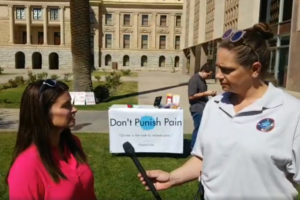15
Tips for Working with Your Legislators To Make A Difference
By Barby Ingle, President, iPain
Keeping in mind that the goal when working with our legislators is to develop an ongoing personal relationship, as well as to influence their position on specific issues or bills.
Here are a few tips for talking to your legislators:
- Do not be disappointed if your legislator sends an aide. Aides are critical to the process.
- Spend a majority of your time working with legislators who haven’t made up their minds.
- Share your personal story – It helps to make your point. You want them to remember your face when they are making decisions about your health conditions.
- Refer to the talking points and other materials on a one-page info sheet. Leaving behind too much materials will end in them being tossed out, make your points concisely.
- Put broad policy issues in a local perspective. Ex. 100 million Americans, 2.4 million Arizonians – They need to know how the issues will impact local voters
- Let them know you are there to serve as resource. Be a partner for them when it comes to chronic disease/pain.
- Legislators will view you as the expert on the issue, so be sure to know the facts.
- Know your issue & offer solutions that work. Provide facts and figures to back up your position.
- Know who your legislators are before making initial contact on an issue. Find out what legislative committees your legislator serves on.
- If a legislator gives you a commitment, check back with them later but don’t badger them with phone calls/emails.
- Don’t debate with a legislator or give ultimatums such as “I won’t vote for you if you do not support my position.” Respect the legislator’s right to disagree with you.
- Do not assume that your legislator knows about your challenge/issue. You have to take the time to educate them. Dont use abbreviations or jargon.
- Convince your legislator that there is something extra special about your cause, because there will most likely be opposition in to speak with them as well.
- Be organized (prepared; accurate; persuasive; timely; and grateful for their time)
- Be a good listener and hear out what your legislator (or their staff) has to say on the issue.
- Always follow up with a written thank you note and amplify your main points.


